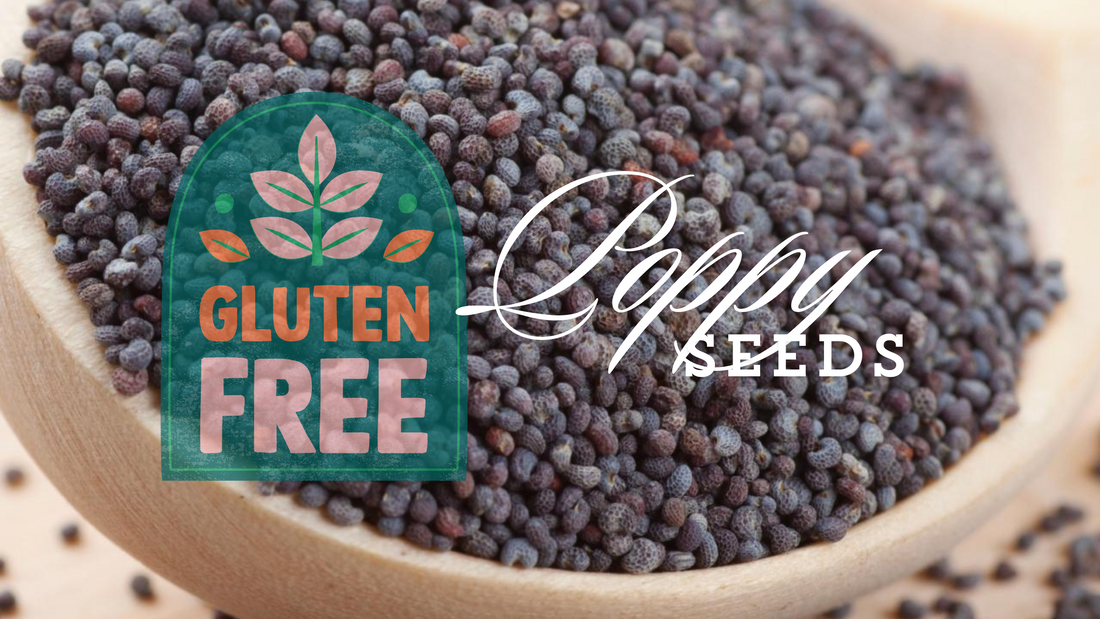
Transform Your Gluten-Free Diet with Poppy Seeds
Share
Unleash your gluten-free lifestyle and discover the magic of poppy seeds with their surprising versatility. These small, nutrient-dense wonders provide much more than a hint of flavor in dishes but an altogether revolutionary experience. Think of gluten-free bread that produces an unexpected crunch or savory fairs taken up a notch with a subtle yet distinctively different twist. Poppy seeds are those magical ingredients that not only fit in with a gluten-free way of life but also come loaded with a powerhouse of essential nutrients, necessary to take your diet to new heights. Adding the magic of poppy seeds to your meals means you are not only improving your food but changing the whole gluten-free regime into an exciting and fulfilling one. Unlock the power of poppy seeds and find a new dimension in your culinary world.
What Are Poppy Seeds?
A Botanical Marvel
These small, kidney-shaped miracles originate from the opium poppy plant Papaver somniferum and boast very rich histories across continents and cultures-from European pastry to Middle Eastern cuisines. And while small in size, they are truly mighty in flavor and nutritional value, hence a very interesting addition to any diet.
Nutritional Powerhouse
Poppy seeds are considered one of the nutritious ingredients in gluten-free cooking. Rich in essential fatty acids, especially omega-3 and omega-6, these seeds contain a huge amount of vitamins and minerals. They have a rich amount of calcium, magnesium, and iron, aside from having quite a good dietary fiber and protein amount. These pack a powerful punch of nutrition, making poppy seeds a bonus to a gluten-free diet-one that will contribute toward a diet that will offer overall balance and nutrition.
Nutritional Value of Poppy Seeds:
Rich in Nutrients
Poppy seeds are not only succulent but also very nutritious. Being adequately rich in calcium, the seeds are good for bone health. Presence of good levels of iron within the seeds helps in maintaining proper health and functionality of the blood. Moreover, the antioxidants present in poppy seeds are contributing factors to good general health. The fatty acid in poppy seeds, in particular, aids heart health and supports metabolic functions, making it an indispensable part of every diet.
A cut above the rest
Poppy seeds contain different nutrients compared to other seeds like chia and flax. This would carry a little more calcium and iron, making it a little more unique than what you add to your gluten-free diet. The texture and flavor are so unique that each dish may not be as mundane to eat.
Culinary Usage in Gluten-Free Cooking
Brilliance in Baking
Poppy seeds are very helpful while baking gluten-free items. From muffins and cakes to bread, these seeds provide an amazing crunch and burst of flavor whenever used. They can also easily be used within your gluten-free flour blends to add texture and nutritional boost to baked goods.
Savory Sensations
But don't stop with baking-poppy seeds shine in savory dishes too. Sprinkle them over gluten-free crackers, toss them into salads, or stir them into dressings and sauces for added texture and flavor. Their versatility lends a guarantee that they will pair with most items, turning them into a must-have ingredient in your gluten-free kitchen.
Poppy Seed Recipes for Gluten-Free
Breakfast Boosters
Begin your day with gluten-free poppy seed breakfasts, such as poppy seed pancakes, muffins, quick breads, or chia-poppy seed pudding that is deliciously satisfying and good for you. The recipe possibilities are endless, tasty, and nutritious for your breakfast.
For Snacks and Dessert
But in snacks and desserts, the poppy seeds are great, too. Think about preparing some gluten-free lemon-poppy seed bars, poppy seed granola, or just simple but great poppy seed and honey energy bites. There's nothing like them for an afternoon pick-me-up as you power through your day, yet stay gluten-free.
How to Incorporate Poppy Seeds into Your Diet Seamlessly
Practical Daily Tips
It can be easier than you think to work poppy seeds into your gluten-free daily life: sprinkled on yogurt, spooned into a smoothie, or sprinkled on for garnish over your food. Versatile enough to fit with so many different dishes, they add flavor and nutrients without much fuss.
Mindful Eating
While poppy seeds are rich in goodness, a little goes a long way. Use them sparingly so as not to overpower dishes; try grinding them a bit to bring out the full flavor and make them more digestively friendly. This mindful approach ensures you get the most out of their unique properties.
Poppy Seeds in Various Gluten-Free Diets
Vegan and Vegetarian-Friendly
Poppy seeds are a great addition to both vegan and vegetarian diets. They provide plant-based sources of protein and essential fatty acids, so they are very practical for incorporation into these dietary schemes. Their value lies in their ability to be included in a remarkable number of dishes, hence versatile and essential in preparing vegan or vegetarian meals.
Paleo and Low-Carb Friendly
Poppy seeds are most definitely not in tune with exact paleo foods. Their nutritional richness and low-carb content make them great substitutions for higher-carb foods, helping to hold on to your dietary goals without sacrificing great tastes or variety.
Conclusion:
Adding poppy seeds to your gluten-free diet may be one of the quick and easy ways of not only making your food more interesting in taste but also a lot more nutritious. Whether you want to bake or cook something savory or just are on your quest for a superfund of nutrients, poppy seeds can answer all your needs in taste and health. Savor the enormous versatility that this great seed allows you and have a newfound experience in the kitchen as you make your gluten-free journey not just enjoyable but packed with good nutrition as well.
Poppy Seeds from Healing Herbals:
Unwashed Poppy Seeds:

Read more about Poppy Seeds:







